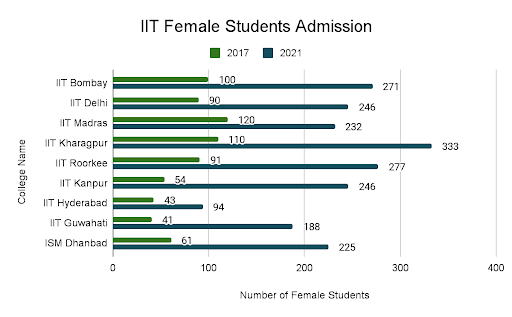Engineering colleges in India have come a long way since the 1990s when the ratio of boys and girls enrollment was 10:1. This ratio decreased to 7:1 in the early 2000s, and to 4:1 in the mid and late 2000s.
Engineering, in India, has long been and continues to be a male-dominated field. However, the introduction of female supernumerary seats in engineering colleges in India has resulted in an increase of females in IITs, which went up to 20% in 2021-22 from 9% in 2017.
The number of female applicants has increased in the IITs with the introduction of Supernumerary seats in Engineering colleges in India.
According to the Society of Women Engineers, women candidates constitute 20% of the total engineering-qualifying graduates. Only 11% of women continue pursuing careers in the Engineering field.
The introduction of female supernumerary seats in the IITs obliterated the difference between male and female students in the top engineering colleges in India. The number of seats was increased for females in IITs instead of reserving from the existing number of seats. The impact of the decision and the increased opportunity reflects in the data from JEE exam and IIT admission trends.
The Situation Earlier
Engineering colleges in India have come a long way since the 1990s when the ratio of boys and girls enrollment was 10:1. This ratio decreased to 7:1 in the early 2000s, and to 4:1 in the mid and late 2000s. It deteriorated further in 2014 when most of the IITs had anywhere between 5% and 12% of girl population on their campus.
IITs in India admitted 995 girls and 9,883 boys, a year before the supernumerary seats were allotted to females. According to reports, 7259 female students qualified for JEE Advanced in 2017 but only 995 got admitted to IITs, which is just 9% of the total strength. This could be attributed to the location of the IITs and the field of study.

A total of 658,191 undergraduate students enrolled in the 2020-21 academic year, of those 30.2% were female students. Women represented 29.2% of participants in BE/ BTech courses in the 2019-20 school year. Mechanical engineering enrolls the highest number of undergraduates, women are exceedingly underrepresented (5.6%) among the graduates. The representation of women is high in architecture (55.7%), electronics engineering (48.7%), and information technology (46.3%) disciplines.
Number Of Female Students Rise In IITs
Prior to the supernumerary quota, only 8% were seeking admission, out of 20% of girls students in the IITs. IIT admissions council decided to include 800 (14%) additional seats for girls across the 23 IITs in 2018. The number rose to 946 (17%) in 2019. The Joint Admission Board (JAB) allowed individual IITs to fix the female enrollment targets at 20%.
The total strength of female students constituted 20% in 2021 as well as in 2022, where females got admission to 3310 seats out of 16635 seats in IITs, prior to 995 in 2017, a year before supernumerary seats were created.
IIT Bombay admitted 271 female students compared to 100 in 2017. IIT Delhi female enrollments increased to 246 from 90 in 2017. The total number of students admitted to the IITs has increased from 10,988 to 16,296 between 2017 and 2021, while the women population almost tripled from 995 to 2,990.

The introduction of female supernumerary seats taken by the Ministry of Education has addressed the issue of gender disparity. The total number of seats allocated to girls never exceeded the threshold of 10% before 2018. The end goal is to eventually eliminate the female supernumerary seats while maintaining the high number of female applicants at IITs. Institutes like IIT Delhi are aiming to move towards a 50:50 gender ratio on their campus.
Top IITs in India: NIRF Ranking 2022
Ranking plays an important role and helps students to choose the perfect college for them. It gives an overview of the college through which one can calculate the ROI, Quality of Education, Infrastructure, etc. NIRF is the most popular and reliable ranking agency in India. NIRF ranks top 300 Engineering colleges in India. There are 9 IIT colleges in the top 10 Engineering colleges in India.
Tabulated below are the top IIT colleges in India with NIRF Ranking 2022.
| NIRF Ranking 2022 | Top IIT colleges in India | NIRF Score 2022 |
| 1 | IIT Madras | 90.04 |
| 2 | IIT Delhi | 88.12 |
| 3 | IIT Bombay | 83.96 |
| 4 | IIT Kanpur | 82.56 |
| 5 | IIT Kharagpur | 78.89 |
| 6 | IIT Roorkee | 76.70 |
| 7 | IIT Guwahati | 72.98 |
| 9 | IIT Hyderabad | 68.03 |
| 13 | IIT BHU | 63.51 |







